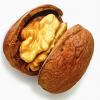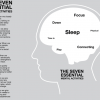Does anybody have any thoughts on low dose selegiline (1 mg/day), co-administered with low dose (5-10mg) of Adderall?
STUDIES:
http://www.ncbi.nlm....pubmed/17651730
Deprenyl treatment attenuates long-term pre- and post-synaptic changes evoked by chronic methamphetamine.
Abstract
Deprenyl, used clinically in Parkinson's disease, has multiple pharmacological effects which make it a good candidate to treat neurotoxicity. Thus, we investigated deprenyl's ability to attenuate methamphetamine-induced dopamine neurotoxicity. We also examined deprenyl's effect in changing markers associated with psychostimulant sensitization. A potential therapeutic effect on either pathological domain would be a boon in developing novel treatments for methamphetamine abuse. Adult male Sprague-Dawley rats were split into 6 groups. Three groups received a 7-day saline minipump with saline, 0.05 or 0.25 mg/kg SC deprenyl injections given for 10 days before, during and 5 days after the 7-day saline minipump implant. Similarly, 3 groups received methamphetamine pumps (25 mg/kg/day) with escalating daily injections of methamphetamine (0-6 mg/kg) in addition to the minipump treatment. These rats also received saline, 0.05 or 0.25 mg/kg deprenyl injections given before, during and the 7-day minipump treatment. Rats were killed on day 28 of withdrawal and brain samples taken. HPLC analysis for dopamine and 3,4-Dihydroxy-Phenylacetic Acid (DOPAC) revealed a loss of dopamine in the caudate and accumbens which was partially reversed by high dose deprenyl. Tyrosine hydroxylase immunostaining in the midbrain was unaffected by methamphetamine, suggesting that dopamine neurotoxicity was localized to the caudate. Western blot analysis of the caudate after methamphetamine revealed little change in Alpha-Amino-3-Hydroxy-5-Methyl-4-Isoxazole Propionic Acid (AMPA) GluR1 or N-Methyl-d-Aspartate (NMDA) NR2B subunits, or their phosphorylation state. However, methamphetamine increased levels of GluR1 and its phosphorylation state in the prefrontal cortex (PFC), and these increases were attenuated by deprenyl. Methamphetamine also increased levels of PFC NR2B subunit, but these increases were not attenuated by deprenyl. We suggest that deprenyl may be effective in reducing the neurotoxic effects of methamphetamine and may also attenuate changes in prefrontal AMPA receptor function, presumably more associated with addiction rather than neurotoxicity.
http://www.ncbi.nlm....pubmed/16757017
Amphetamine-induced locomotor activity is reduced in mice following MPTP treatment but not following selegiline/MPTP treatment.
Abstract
MPTP treatment has been used in mice to cause dopaminergic neuronal cell loss and subsequent behavioral abnormalities. As such, this animal model is often used as a method for the characterization of putative novel therapeutics for disease states characterized by dopamine loss, such as Parkinson's disease. Previous reports of behavioral abnormalities in mice following MPTP intoxication, however, have been conflicting. For example, open field spontaneous activity has been reported to increase, decrease or not change in MPTP treated mice. Accordingly, a more robust and direct functional measure of MPTP-induced central dopamine depletion is needed. In the present manuscript, we report on the characterization of amphetamine-induced locomotor activity as a sensitive functional endpoint for dopamine loss following MPTP treatment. We found that the amphetamine-induced locomotor activity of C57BL/6 mice was reduced in a dose-dependent manner following treatment with MPTP. This reduction of activity was associated with decreases in central dopamine levels. Further, the potential for use of this endpoint to evaluate putative therapeutics is exemplified by the amelioration of these effects following pre-treatment with the MAO-B inhibitor selegiline.
http://www.ncbi.nlm..../pubmed/9920178
The amphetamine-like reinforcing effect and mechanism of L-deprenyl on conditioned place preference in mice.
Abstract
The present study investigated the reinforcing effect of L-deprenyl on conditioned place preference in mice and its mechanism. Conditioned place preference was induced by 10 and 25 mg/kg L-deprenyl in a dose-dependent fashion during five consecutive conditioning days, and its reinforcing property was about five-fold less potent than that of L-amphetamine. Pretreatment with the dopamine antagonist, haloperidol (1 mg/kg i.p.), effectively blocked the place preference produced by L-deprenyl (10 and 25 mg/kg i.p.) and L-amphetamine (2 and 5 mg/kg i.p.), but haloperidol itself produced no place aversion. The neurotoxin, 1-methyl-4-phenyl-1,2,3,6-tetrahydropyridine (MPTP), 30 mg/kg did not modify the place preference induced by both L-deprenyl and L-amphetamine, though the dopamine concentration in striata assayed by high performance liquid chromatography with electrochemical detection (HPLC-EC) was significantly reduced. These results suggest that L-deprenyl has amphetamine-like reinforcing properties. The reinforcing effect of L-deprenyl may be mediated by central dopaminergic neuronal systems, while the nigrostriatal dopaminergic pathway is not involved.
http://www.ncbi.nlm....pubmed/10193780
Effect of low-dose treatment with selegiline on dopamine transporter (DAT) expression and amphetamine-induced dopamine release in vivo.
Abstract
1. Chronic treatment with low doses of the selective monoamine oxidase (MAO) type B inhibitors selegiline [(-)-deprenyl] and rasagiline, causes elevation in extracellular level of 3,4-dihydroxyphenylethylamine (dopamine) in the rat striatum in vivo (Lamensdorf et al., 1996). The present study was carried out to determine whether this effect of selegiline could be the result of an inhibition of the high-affinity dopamine neuronal transport process. 2. Changes in activity of the dopamine transporter (DAT) in vivo following selegiline treatment were evaluated indirectly by microdialysis technique in the rat, from the change in striatal dopamine extracellular concentration following systemic amphetamine administration (4 mg kg(-1), i.p.). Striatal levels of the DAT molecule were determined by immunoblotting. Uptake of [3H]-dopamine was determined in synaptosomes from selegiline-treated animals. 3. Amphetamine-induced increase in striatal extracellular dopamine level was attenuated by one day and by chronic (21 days) treatment with selegiline (0.25 mg kg(-1), s.c.). 4. Striatal levels of DAT were elevated after 1 and 21 days treatment with selegiline, but were not affected by clorgyline, rasagiline, nomifensine or amphetamine. 5. The increase in DAT expression, and attenuation of amphetamine-induced dopamine release, were not accompanied by a change in [3H]-dopamine uptake in synaptosomes of selegiline-treated animals. 6. The results suggest that a reversible inhibition of dopamine uptake occurs following chronic low dose selegiline treatment in vivo which may be mediated by an increase in endogenous MAO-B substrates such as 2-phenylethylamine, rather than by the inhibitor molecule or its metabolites. Increased DAT expression appears to be a special property of the selegiline molecule, since it occurs after one low dose of selegiline, and is not seen with other inhibitors of MAO-A or MAO-B. The new DAT molecules formed following selegiline treatment appear not to be functionally active.
http://link.springer...A:1007632700126
Biphasic Effects of Selegiline on Striatal Dopamine: Lack of Effect on Methamphetamine-Induced Dopamine DepletionAbstract
We tested the hypothesis that selegiline can attenuate dopamine depletion if administered following high doses of methamphetamine that cause neurotoxicity in the striatum. Methamphetamine produced decreases of 50% or greater in both striatal concentrations of dopamine and combined concentrations of homovanillic acid and DOPAC in mice. For animals not exposed to methamphetamine, chronic treatment with selegiline over 18 days caused biphasic effects on striatal dopamine content, with decreases, no effect, or increases observed for mice receiving treatment with 0.02, 0.2, and 2.0 mg/kg, respectively. Selegiline failed to modify methamphetamine-induced reductions in striatal dopamine content or combined concentrations of homovanillic acid and DOPAC. Significant increases in mortality following the onset of selegiline treatment (24 hours after the initial dose of methamphetamine) occurred in methamphetamine-treated mice that received saline or 2.0 mg/kg of selegiline, but not for mice treated with 0.02 or 0.2 mg/kg of selegiline. These results indicate that selegiline fails to attenuate dopamine depletion when administered chronically following exposure to methamphetamine, but may attenuate methamphetamine-induced mortality. In control animals that did not receive methamphetamine, low doses of selegiline produced decreases the concentration of striatal dopamine, while high dose treatment caused increases in striatal dopamine content.
Edited by NeuroGeneration, 14 July 2014 - 06:33 PM.


























































